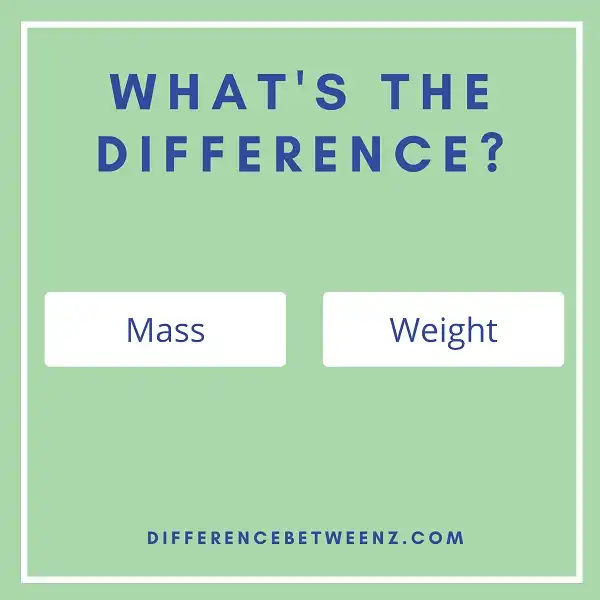Mass vs. Weight
What is Difference between Mass and Weight? Mass and weight are two terms that are often used indistinctly in everyday life. Many people talk about the mass of an object as if it were its weight and the weight to refer to the mass. But these concepts are very different and then we will see what those differences are between them. Below this post is all about the Difference between Mass and Weight.
Difference between Mass and Weight
Mass
Mass is the amount of matter an object has. It is divided into two types: inertial mass and gravitational mass. The most common type used in physics is inertial mass, which is a quantitative measure of an object’s resistance to acceleration. On the other hand, the gravitational mass is a measure of the magnitude of the force of attraction that is exerted on determined object.
In the International System of Units, the unit used to measure mass is kilogram (kg), while in other systems pounds (lb) and grams (g) are also used to refer to mass.
The mass should not be confused with the quantity of a substance. Matter and energy may well be two different forms of mass. According to Einstein’s Theory of Relativity, electromagnetic waves also have mass. According to this theory, there are two types of mass: the mass at rest and the relativistic mass. According to this same theory, the mass of an object does not always remain constant. The mass at rest, as its name indicates; is the mass of an object at rest, while the relativistic mass refers to the mass of the object when it is in motion.
In everyday usage, the term “mass” is used as “weight”, but the latter is more related to matter than to mass.
Weight
Weight refers to the measurement of the force of gravity on an object. This differs constantly, since the force of gravity is not equal everywhere (a person’s weight is not equal on Earth and on the Moon. Example: a person with a mass of 50 kg and a weight of 491 newtons in the Earth, on the Moon will have the same mass, but will only weigh 81.5 newtons).
Generally, the weight is measured in newtons (N), not in (kg). In short, weight is the gravitational force acting on a body, while mass is the intrinsic property that does not change.
The formula for calculating the weight of a substance is P = M * G: Weight equals mass by gravity. The concept of weight was developed from Newton’s Laws of Motion and the Law of Universal Gravitation. This resulted in the separation of weight and mass.
When we measure ourselves, we usually call that (our weight), but in reality what we are measuring is our mass. There are machines that can measure our mass and others that can measure our weight. The machines we see in doctors’ offices, which use a balance scale to measure our “weight”; in reality what they measure is our mass.
Now, there are machines in which people stand still for a moment and at the end their true weight (in newtons) appears on a screen. They do measure weight and not mass.
Key differences between Mass and Weight
- The weight may vary, but the mass is constant.
- The mass is measured in kilograms (kg), while the weight is measured in newtons (N).
- Mass refers to the amount of matter an object has, but the weight refers to the force of gravity acting on an object.


